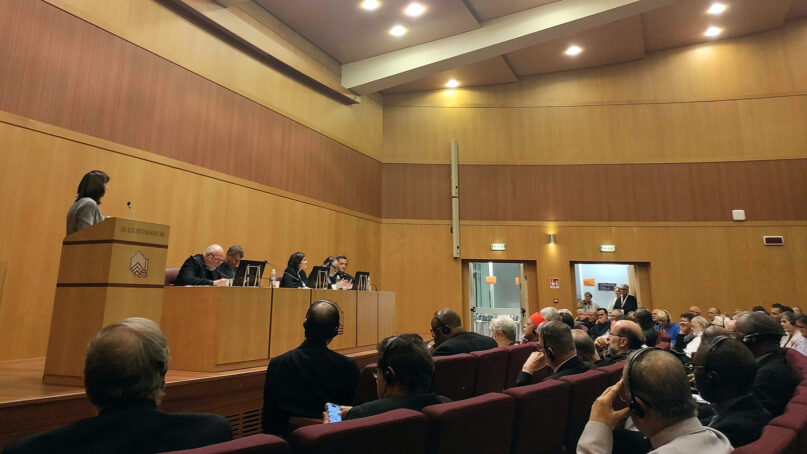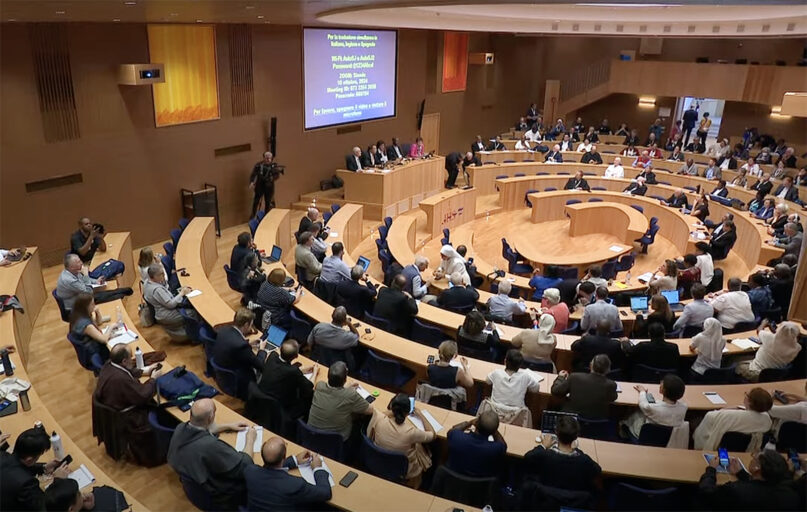VATICAN CITY (RNS) — As bishops and Catholic leaders gather at the Vatican for a monthlong summit on the theme of synodality, many are still left wondering what the event is actually about.
On Wednesday (Oct. 9), participants at the summit convened in two theological forums where everyone — including journalists — was allowed to attend. The events permitted a rare glimpse into the debates and conversations taking place in the synod hall, centered on the role of bishops and the involvement of all believers into the church’s decision-making process.
A three-year consultation centered on dialogue and listening at all levels of the church, the Synod on Synodality was called by Pope Francis to promote “a new way of being church.” But in March, the pope said that some of the controversial issues that emerged during the debates — including women’s ordination, priestly celibacy and the inclusion of LGBTQI+ individuals — were off the table until 2025.
This left many faithful and Vatican observers wondering what was the focus of the Oct. 3-27 Synod on Synodality.
Instead of introducing sweeping reform to Catholic doctrine and magisterium, the ongoing synod emerged as a think tank for microchanges in church structure. Those changes could usher in profound structural transformation in the institution by allowing more laypeople to be involved in running the church.
At the Patristic Institute Augustinianum near the Vatican, a panel of theologians spoke about the role of bishops, who occupy a central place as rulers, pastors and judges in the hierarchical church. Panelists argued that the centralization of power and responsibility around bishops has led many of them to become depressed, overworked and burnt-out.

The forum at the Patristic Institute Augustinianum in Rome, Oct. 9, 2024. (RNS photo/Claire Giangravé)
Archbishop Roberto Repole of the two dioceses of Turin and Susa, Italy, said that as the responsibilities of bishops began to grow and expand, “there is a risk of making everything sacred.”
Repole, a respected theologian who will be made a cardinal at the next consistory at the Vatican, suggested allowing laypeople, priests and deacons to take over some of the responsibilities of bishops.
The Rev. Matteo Visioli, a canon lawyer from the Gregorian University in Rome, underlined the need for bishops to offer laypeople more responsibility in the church while governing with accountability and transparency.
Argentine theologian Carlos Maria Galli argued that more study should be made on the need for a separation of powers and for checks and balances to the bishops’ authority. At the end of the day, he said, the crisis of authority in society also influences the bishops, who struggle to appropriately handle the pressures and responsibilities of their position.
Sister Gloria Liliana Franco Echeverri read a long list of demands by faithful for bishops, who are called to lead with others, combat abuse and be humble. One attendee at the synod responded by saying that bishops cannot be “supermen” and that reforms should be oriented toward “helping bishops help others.”
The role and influence of laypeople in the church echoed throughout the chamber, as synod members asked whether regular Catholics should have a say in who becomes the head of their diocese. The need for lay involvement was at the heart of a second forum on the same day at the General Curia of the Jesuits in Rome.

The theological forum at the General Curia of the Jesuits in Rome, Oct. 9, 2024. (Video screen grab)
Canon lawyer Donata Horak, who teaches at the Alberoni Theological Study in Piacenza, Italy, said the church “must rediscover the link between law, theology and life,” adding that there are many opportunities in the church available to nonordained Catholics.
“There is a resistance to the participation of the people of God, which even goes beyond the limits of the law,” she said. “If the code were at least executed in all its possibilities, we would have a much more vital and participative church.”
Horak suggested that canon law be amended to make consultative bodies of lay faithful mandatory for parish priests and bishops, open plenary and regional councils to all Catholics and create new institutions that allow laypeople to have an active role in the church.
“There are so many possibilities that the current system would allow, if fully implemented or reformed,” she said.
Instead of writing a new set of laws, Horak said, the Vatican could simply issue guidelines for local churches to decide on and regulate, which would foster a “healthy decentralization” with respect for the right of all Catholics to have a say.
“All are co-responsible for the mission and equal in Christ,” she said.














